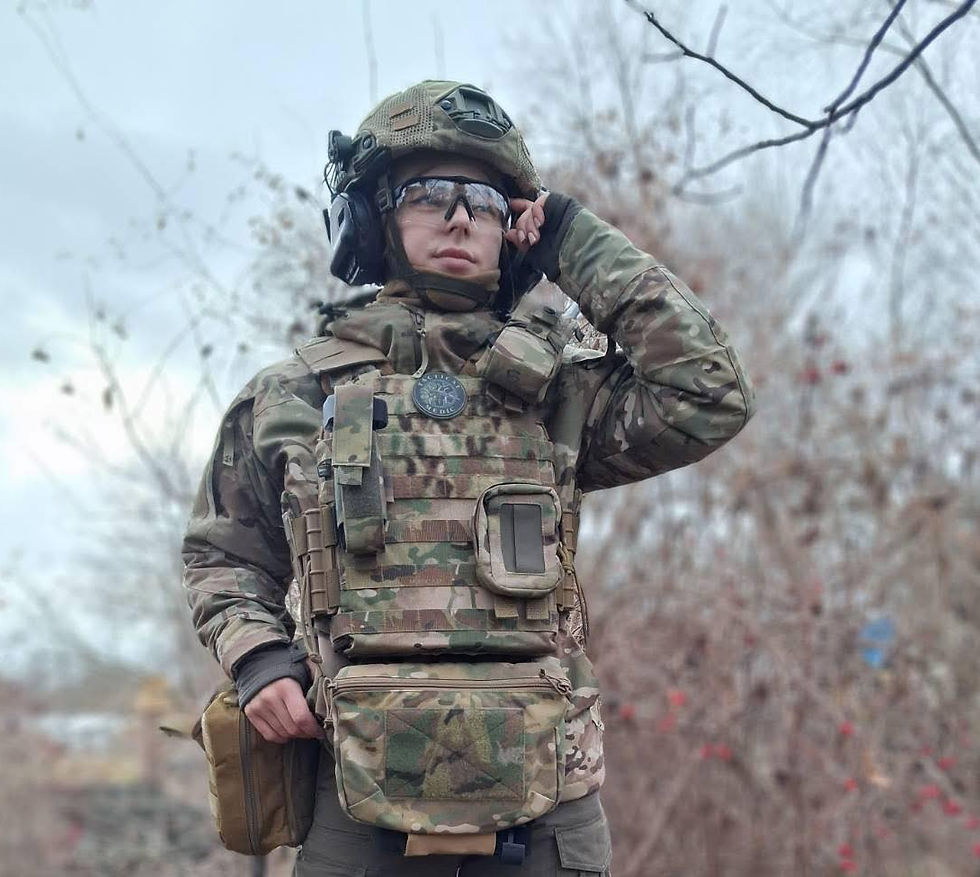"For the sake of every life" - Hospitallers medical battalion
- Oleksiy

- Aug 4, 2023
- 3 min read
"Hospitallers" is one of the medical battalions. More about medical assistance was shared by a paramedic from the "Hospitallers" medical battalion with the call sign "Kalash."

Based on what principle are medics assigned to different frontline directions, and do "Hospitallers" operate on all fronts?
- "Hospitallers" provide assistance at all points. There are several brigades or battalions assigned to each direction. Different types of vehicles are used for maneuvering trips. There are pickups or vehicles that can go anywhere. Another type is the cars, fully equipped for emergency resuscitation. There are many crews in the battalion that rotate in shifts, coordinating among themselves. There is a chief coordinator for all rotations who arranges with all the brigades that require our assistance. They determine the rotation schedule, which can vary: one crew for a month, then another crew for a month, or one crew for two weeks, followed by another crew for two weeks.
Where have you worked?
- We have been in Kharkiv, particularly in Izyum. We've been in Zaporizhzhia and Avdiivka. With my crew, we've been to almost all points, except the Kherson.
When did you join the "Hospitallers"?
- I was familiar with paramedicine since 2015 because I attended courses. I'm primarily an athlete, but also have an interest in medical matters. I'm not a medical professional by trade, but I have some qualifications in paramedicine. I joined the Hospitallers in 2022, but I was familiar with them before that.
What challenges do you face? - Our work is probably quite straightforward. We operate based on specific algorithms we learn and teach. We need to do everything according to a plan, not invent anything new, and try to act quickly to save lives. We sometimes face shelling at our evacuation points, dealing with a large number of wounded who need to be transported on one or two vehicles. The challenge lies in situations where there's limited transport available to quickly deliver them to a point for treatment.
Tell us more about your crew and the relationships within it.
- Our Pavlohrad crew is from my city. We work only with people from our city, and we are all friends. I like the attitude of the people in our team who are under my leadership during rotations. They treat me, my words, and my suggestions on how to conduct evacuations and provide assistance with great respect. I'm always amazed at how people can remain humane in difficult situations and find joy in small pleasures.
"Hospitallers" is a volunteer organization. Do you receive funding for supplies, vehicles, or any payments for paramedics?
- Our battalion is a volunteer one, and it still operates thanks to people who donate for medical needs and transportation. Many people admire our work and provide financial, media, or humanitarian support. "Hospitallers" are probably one of the best-equipped medical battalions in our country. We have a large number of medical vehicle crews equipped with medical supplies, tactical medicine, gear, uniforms, medications, and a significant fleet. However, all of this is thanks to the people who help us from Europe, the USA, and Ukraine. Our crews are entirely voluntary, and they choose to participate during their rotations while taking time off from their regular jobs. It's all made possible by the willingness of our people.
How many people are there in the battalion in total?
- There were a minimum of 600 people. However, since the full-scale war began, our numbers have increased, and there's a long queue for our training. During the training, we teach people basic medical assistance, and after completing it, they have the opportunity to go on rotations and help save the wounded. Currently, this number is around 1000 individuals.
How long does the training last?
- It's a full 10-day training where we teach both theory and practice. I know this well because I'm currently an instructor for this training. We conduct the training in parallel with rotations.
Have there been situations where you were close to losing hope but persevered? What helped you?
- In terms of my character and emotional makeup, I don't allow negative emotions to affect me, whether it's injuries or death. I approach this as a professional endeavor – to not be swayed by wounds, emotions of the wounded, but to follow algorithms and act quickly. It's essential to quickly release the emotions one experiences when helping a wounded person during the war. So, I don't even entertain these thoughts in my mind. In our team, we always try to encourage each other and never discuss negative factors. We only talk about what we did correctly, what we did wrong, what we could do better, what we did exceptionally well, what we need to improve, and how great our time will be after the war. #Hospitallers #Paramedics #UkraineParamedics #HospitallersUkraine #HospitallersUK #HelpHospitallers #Ukraine #SupportUkraine #HelpUkraine #StandWithUkraine #HelpUkraineNow




Comments